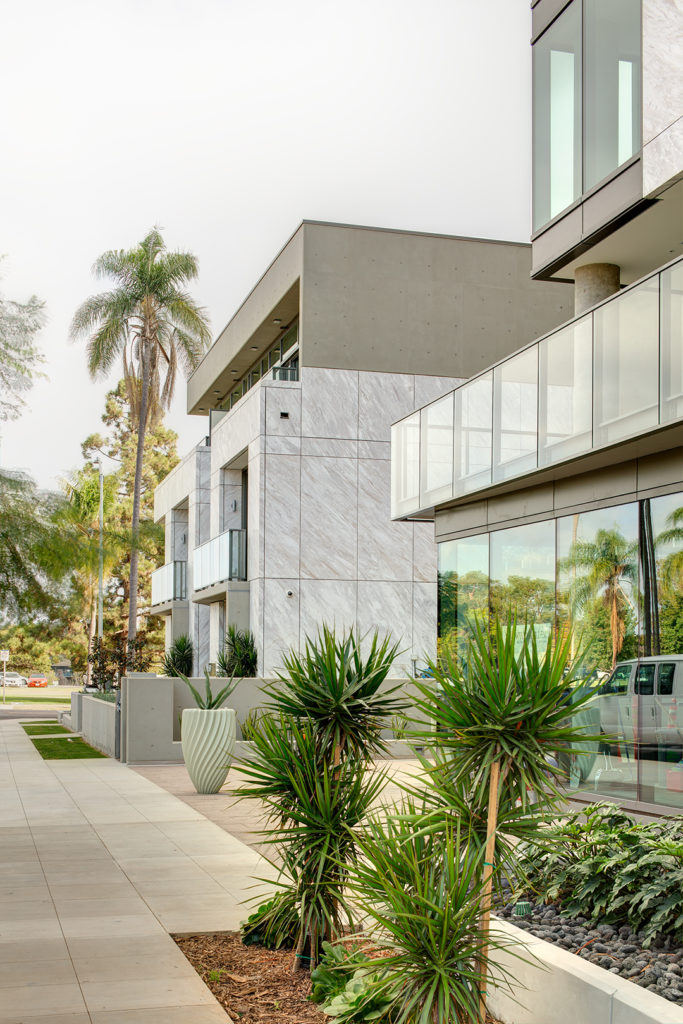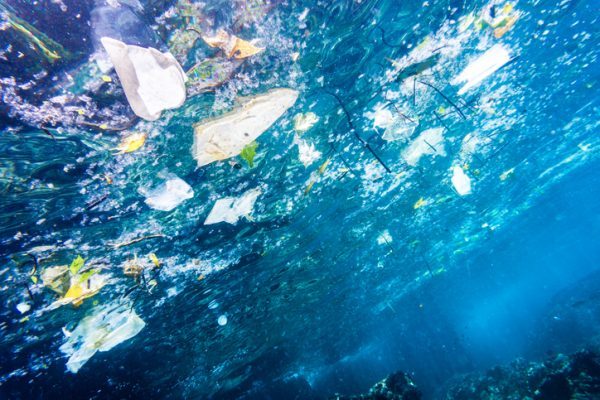Daily Business Report-Aug. 15, 2019
Rendering of Protea Properties’ Bayview Plaza development proposal. (Photo courtesy of Protea Properties)
Protea Properties plans transit-oriented, mixed-use
project along Morena Boulevard corridor
Protea Properties announced plans Wednesday for Bayview Plaza, a new mixed-use projec proposed for the Linda Vista neighborhood that it said will address the region’s growing housing crisis and provide new amenities for the Bay Park community and visitors to Mission Bay.
Protea Properties’ Bayview Plaza proposes 156 residential units and 40,000 square feet of commercial space at the corner of Morena Boulevard and Clairemont Drive. The property is located immediately adjacent to the future Blue Line Trolley Station and will include 150 parking spaces for transit riders. The proposed project also includes 16 units that will be designated affordable for families earning up to 50 percent of the area median income.
Protea Properties is working with the city of San Diego and SANDAG to design the project to support regional policy goals, including efforts to reduce greenhouse gas emissions by increasing transit ridership. The project will include 150 parking spaces for trolley riders. The development will also include mobility hub features to support trolley ridership, potentially including charging stations for micro- mobility bikes and scooters, real-time transit displays and bike parking.
Potential commercial uses could include restaurants, fitness, co-working office space and a market, providing a true neighborhood town center.
The city’s Development Services department is currently reviewing the project.
____________________

Craft brewers’ economic impact
on San Diego County rises to $1.2 billion
By Brandon Hernandez | West Coaster
For the third straight year, the San Diego Brewers Guild released economic findings from a report assembled by California State University San Marcos. The information was disseminated at Tuesday’s San Diego Craft Beer Con industry event.
The report found that in 2018 San Diego County’s 150-plus independent craft breweries produced an economic impact of $1.2 billion with industry revenue coming in at $848 million. The aforementioned impact was up 6 percent from 2017. That rate is 1.2 percent greater than national industry figures.
Additional findings of the report are as follows:
- No state has a larger number of operational craft breweries as California with more than 900.
- California ranked second in the U.S. in craft-beer production with 3.4 million barrels.
In 2018, San Diego craft breweries produced 1.13 million barrels of beer (up 3 percent from 2017) representing a third of the beer produced in California.
- At the start of 2019, San Diego County boasted 202 venues owned by independent brewing interests.
- San Diego County craft-brewing companies provided 6,480 jobs.
- Local independent brewers’ contributions to nonprofit organizations and charity campaigns totaled $5 million in 2018.
The data leading to the above conclusions was collected from multiple sources during the first quarter of 2019, including IBISWorld, the Brewers Associationand California Craft Brewers Association.
CSUSM’s report does not account for the impact of breweries that do not meet the SDBG’s qualifications for inclusion as an “independent brewery” due to acquisition by macro-beer conglomerates, meaning data pertaining to local interests Ballast Point Brewing (owned by Constellation Brands), Saint Archer Brewery (owned by MillerCoors) and 10 Barrel Brewing (owned by A-B InBev) was not factored in.
____________________
Cubic buys minority stake in data
management tech provider Pixia
GovCon Wire

Cubic has purchased a 20 percent stake in commercial technology firm Pixia for $50 million in a push to expand the portfolio of offerings of its mission solutions business.
Bradley Feldmann, chairman, president and CEO of Cubic, said during the company’s earnings call on Aug. 6 that the transaction provides Cubic an option to acquire by February 2020 the remaining 80 percent stake in Pixia.
“This acquisition aligns with and enables our battlefield cloud strategy of processing and disseminating data rich actionable intelligence across the enterprise and at the edge of the battlefield in real time,” Feldmann said.
Herndon, Va.-based Pixia offers high-performance platforms designed to manage and process large amounts of imagery data, wide-area motion imagery and geospatial data for U.S. intelligence agencies and other government clients.
Cubic Mission Solutions saw its sales climb 122 percent to $95M in the third quarter of fiscal year 2019, which reflects increased deliveries across all its product lines, including secure network products and expeditionary satellite communications platforms.
____________________

SANDAG celebrates launch of new Vision Lab
SANDAG celebrated the launch of the new Vision Lab on Tuesday, a collaborative space for agency staff, elected officials, working groups, and industry leaders to discuss ideas, data, and tools for developing a fully integrated, world-class transportation system in the San Diego region.
SANDAG staff and industry leaders were on hand to discuss San Diego Forward: The 2021 Regional Plan and the 5 Big Moves, key strategies that will be used to develop a bold new transportation vision. Attendees saw demonstrations of a digital sketch planning tool, explored interactive maps to learn where people live and work around our region, and spoke with subject matter experts about how the 5 Big Moves – Complete Corridors, Transit Leap, Mobility Hubs, Flexible Fleets, and the Next Operating System (OS) – will improve commute times and the environment.
“If you want to design something that people will actually use, you have to bring together policy makers, planners, technologists, and the community in a collaborative way,” said Colleen Emmenegger, Vision Advisory Panel member and Head of People Centered Automation at the UC San Diego Design Lab.
The Vision Advisory Panel will provide expert input about how to deploy technology solutions to solve complex transportation problems and guide SANDAG leadership on how to best future-proof the transportation system.
____________________

Zephyr wins townhome design award
for its 60-unit The Park, Bankers Hill

Encinitas-based developer Zephyr has won the American Institute of Building Design’s Grand ARDA award for townhome design for its luxury mid-rise, The Park, Bankers Hill.
ARDA, the American Residential Design Awards, celebrate creativity and innovation demonstrated by residential designers, builders, remodelers, architects, developers, interior designer and land planners.
The Park, Bankers Hill contains 60 total units, six of which are luxurious town homes.
“Winning an American Residential Design Award for The Park, Bankers Hill is an incredible honor,” said Brad Termini, CEO of Zephyr. “Being recognized by such a prestigious group for the dedication and effort we put into bringing our vision for this project to life is very special.”
____________________
Invested Advisors founder Crystal Sargent
to chair March of Dimes annual Signature Chefs Gala

Crystal Sargent, president and founder of Invested Advisors, will return as event chair for the March of Dimes annual Signature Chefs Gala, one of San Diego’s largest charity events. The gala will be held Oct. 2 at the Del Mar Race Track.
As the event chair, Sargent will play an integral role in raising awareness and funds to advance the scientific research and educational programs at the core of March of Dimes efforts to lead the fight for the health of all moms and babies. With 25 years of experience as a brand and business builder in the financial services sector, and as a business owner supporting public agencies and private enterprise, Sargent is known for positioning organizations as top brands and helping them grow into that space through a disciplined process, collaborative relationships and creative excellence.
“I am happy to lend my time, talent and treasure to March of Dimes as it is a wonderful cause and it’s rewarding to be able to apply my talents to benefit others,” says Sargent. “My hope is that we’re able to help March of Dimes expand critical research and programs, so that more women and men improve their chances of having healthy babies.”
According to the March of Dimes, the United States is in the midst of a maternal and child health crisis, with more than 380,000 babies born prematurely each year, as well as more than 50,000 women experiencing life-threatening complications as a result of pregnancy and childbirth. March of Dimes is working in communities across the country to reduce the rising rates of premature birth, as well as maternal mortality and morbidity, supporting women before, during and after pregnancy to ensure all moms and babies are healthy.
____________________
Defaulted bills sent to nearly 23,000
San Diego County property taxpayers
San Diego County Treasurer-Tax Collector Dan McAllister said his office is mailing nearly 23,000 defaulted bills to property taxpayers who failed to pay all their 2018-2019 property taxes. “We are sending 22,850 bills this week, which is 2,449 fewer than we sent last year,” said McAllister. “These numbers are a positive sign that our economy is continuing to improve.”
The Treasurer-Tax Collector’s Office (TTC) sent over 36,000 reminders to late taxpayers in June, warning them that they will have to pay more if their taxes go into default.
The default deadline was July 1, so each late bill will incur an extra 1.5 percent penalty each month (18 percent each year) it goes unpaid. That is on top of the 10 percent penalty added for each late installment. The total amount due is $106,463,760.
Threat of increased penalties is not the only incentive for people to pay their taxes. Under California law, the TTC may sell any or all portions of properties that have been in default for five years.
____________________

Commentary
We’re choking on plastic. California
must take the lead in reducing its use
By Genevieve Abedon | Special to CALmatters

By now, you may be overwhelmed by endless stories of marine wildlife and land animals being affected by plastic. You may know that this widespread waste in the ocean, on land, and in the food chain means that all of us breathe, drink, and eat microplastic particles every day. We’re facing a macro-problem.
Food packaging chemical additives migrate out of packaging and into our food and beverages, posinghealth risks. Plastic microfibers and microplastics are in seafood, tap and bottled water, dust, and agricultural soil.
Oil refineries, plastic manufacturers and incinerators tend to be located in low income communities, whose residents bear the brunt of the associated health impacts. Through these sources, plastic and associated chemicals can end up in human tissues, potentially causing an adverse effect on our health.
The entire plastics life cycle contributes to our climate crisis. Harming communities and ecosystems from start to finish, it begins with fossil fuel extraction, continues through manufacturing, transport, and occurs when discarded plastics emit greenhouse gases as they break down. In spite of these dangers, plastic production is projected to increase significantly in the next decade.
Another problem with this garbage is its financial cost.
California communities and taxpayers spend almost $500 million annually to clean up and prevent litter in streets, storm drains, parks, beaches and waterways.
And because China and other countries that used to purchase recyclable materials have stopped doing so, much of the waste accumulates in recycling centers and landfills, further burdening our local governments.
California is attempting to slow this plastic tide. State laws and local ordinances regulate bags, straws, microbeads, and polystyrene. Californians want these changes.
When the plastic bag industry funded a 2016 ballot measure to repeal the law to ban plastic bags in grocery stores and retail outlets, voters enthusiastically upheld the ban. California must continue to demonstrate leadership in addressing the global garbage crisis.
This year California has created an opportunity to do so. The Clean Seas Lobbying Coalition, along with a diverse group of businesses, environmentalists, local governments, and others, strongly supports a pair of measures that would accomplish a revolutionary yet reasonable goal.
Senate Bill 54 by Sen. Ben Allen, Santa Monica Democrat, and Assembly Bill 1080 by Assemblywoman Lorena Gonzalez, San Diego Democrat, offer a comprehensive, material-neutral approach to create a real solution.
Manufacturers would be required to reduce all single-use packaging and the top 10 most littered single-use plastic products in the state by 75% by 2030.
Producers would have flexibility to determine how to best redesign their products and packaging for reusability, true recyclability and compostability, and use of fewer materials and more recycled content.
Public input and critical state oversight would ensure that reduction goals and recycling requirements are met.
If approved, the law would create better consumer choices, reduce litter clean up and waste management costs, and improve the health of California’s people, wildlife, and environment.
That’s why we in the Clean Seas Lobbying Coalition are asking Californians to contact their legislators to urge their support for these very important bipartisan-supported measures.
Genevieve Abedon is an advocate for the Clean Seas Lobbying Coalition, a coalition of 11 organizations dedicated to source reduction solutions to the plastic pollution crisis, genevieve@ecoconsult.biz. She wrote this commentary for CalMatters.



